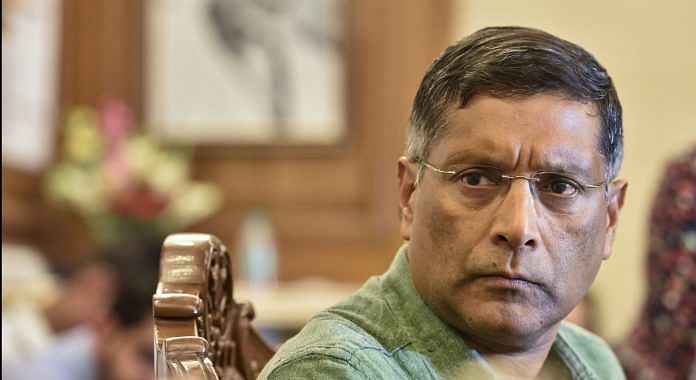New Delhi: Chief Economic Adviser Krishnamurthy V. Subramanian will present his first Economic Survey Thursday.
The Economic Survey has typically been a review of the performance of different sectors of the economy in the year gone by. However, under Subramanian’s predecessor Arvind Subramanian (2014-2018), the document was used to float many new ideas, although many of these were not implemented by the Narendra Modi government.
Whether the incumbent Chief Economic Adviser will follow in the footsteps of the other Subramanian will be known when he releases the Economic Survey. Until then, ThePrint lists the big ideas floated in the surveys over the past few years.
JAM trinity — Economic Survey 2014-15
In his first economic survey, Subramanian coined the term ‘JAM trinity’, which refers to Jan Dhan Yojana, Aadhaar and mobile number. Subramanian advocated the use of the JAM trinity to plug subsidy leaks and ensure a more targeted delivery. He argued that bank accounts opened under the Jan Dhan Yojana and seeded with Aadhaar IDs could be used for cash transfers while minimising distortions. At the same time, India’s rapidly-growing mobile network could be used to solve the problem of last-mile connectivity, he said.
The ‘4Rs’ to resolve the twin balancesheet problem — Economic Survey 2015-16
Subramanian suggested using the 4Rs — Recognition, Recapitalisation, Resolution, and Reform — to resolve the problem of stressed balance sheets of both commercial banks and the companies they lent to.
He called for timely and accurate recognition of stressed assets, recapitalisation of state-run banks to maintain the capital adequacy ratio, selling-off or resolution of stressed assets, and incentives for the private sector and corporates to avoid the problems from recurring.
He also proposed redeploying the RBI’s excess capital to recapitalise state-run banks.
Universal basic income — Economic Survey 2016-17
Proposing a universal, unconditional and direct income transfer, Subramanian argued that a just society should guarantee a minimum basic pay to every individual. A universal basic income, he said, is key to eliminating poverty. To fund the scheme, Subramanian made a case for phasing out some of the subsidies available to the middle class. In light of fiscal and administrative concerns, he recommended a phase-wise implementation of the scheme.
Revamping the judiciary — Economic Survey 2017-18
Subramanian described timely justice as the next frontier for ease of doing business. He advocated expanding the judicial capacity of lower courts and reducing the burden on high courts and the Supreme Court. Limiting the appeals filed by the tax department, modernisation of courts, and creating more subject-specific benches were some of the other suggestions made in the survey.
Also read: New Economic Survey set to map Modicare and nutrition, find what’s afflicting India




Dr A S prepared fantastic Economic Surveys. As the column notes with some regret, they did not translate into economic Taj Mahals. 2. That takes me back to the start of my career, as a Management Trainee with Dr Charat Ram. He wanted management information to be put up to him in elaborate formats, which he kept changing and chipping. An older colleague explained to me, that was Lalaji’s way of fixing the figures firmly in his mind. His older brother, Dr Bharat Ram, was entirely different. A man after my heart, he wanted a few important figures – production, sales, profit, cash availability- to be written for him on a piece of paper. 3. We do not want erudite Economic Surveys. We are all waiting anxiously to see the light of day for the economy.